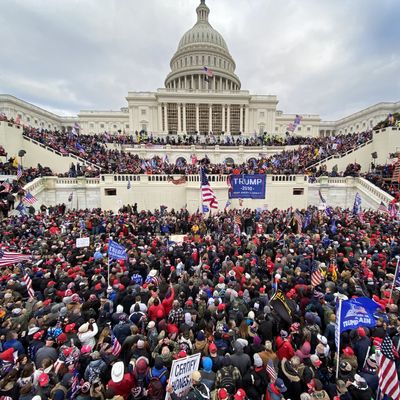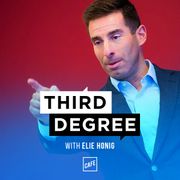

Photo: Tayfun Coskun/Anadolu Agency/Getty Images
The Supreme Court just effectively threw out hundreds of convictions of January 6 rioters. And when it comes to one particular defendant of great public concern – a certain Donald John Trump – the Court’s decision leaves DOJ Special Counsel Jack Smith in a tricky position, with a critical decision point now at hand.
The Court’s decision today arises in the case of Joseph Fischer, who was at the Capitol on January 6, exhorted his fellow rioters to “charge,” and briefly clashed physically with police at the scene. The Justice Department charged Fischer with a crime known as “Obstruction of an Official Proceeding,” plus other offenses. That obstruction law applies to anyone who “alters, destroys, mutilates, or conceals a record, document, or other object… with the intent to impair the object’s integrity or availability for use in an official proceeding” or who “otherwise obstructs, influences, or impedes any official proceeding.”
DOJ’s theory was that the meeting of Congress to count the electoral votes on January 6, 2021 was an “official proceeding” and that, by storming the Capitol, Fischer and others sought to “otherwise obstruct, influence or delay” that governmental function.
Seemed fairly straightforward, in the humble view of this former prosecutor – and most federal judges, up until now. Fischer and dozens of other January 6 defendants have argued in the lower courts that the statute applies narrowly to tampering with documentary evidence, but not to the riot at the Capitol and the attendant effort to physically interfere with government proceedings. (It all turns on the meaning of “otherwise,” if you’re into hardcore statutory construction.) The district court judge ruled in Fischer’s favor – surprisingly, and contrary to many other federal judges – but the DC Circuit Court of Appeals reversed and reinstated the obstruction charge, by a two-to-one vote.
Now we have a definitive answer, courtesy of the nation’s highest court. The obstruction law does not apply to physical efforts to interfere with Congress on January 6, and the charge against Fischer is out the window. Reasonable minds can debate whether the Supreme Court got it right here. I’m firmly in the dissenting camp, along with real-life Justices Sotomayor, Kagan, and Barrett. I agree with the losing side that the Court’s majority gives the obstruction statute an unjustifiably narrow reading to prevent its application to the January 6 Capitol attack.
But that’s an academic argument at this point. It’s like debating the weather. Like it or not, it just is.
So let’s get practical. The ripple effect will be substantial and immediate. The Justice Department has charged over 300 Capitol rioters under the obstruction statute. Most of those cases, like Fischer’s, involve other charges beyond obstruction, so those defendants aren’t off the hook entirely – though they can now seek reduced sentences because their obstruction convictions are now effectively invalidated. About fifty January 6 defendants have been convicted only for the obstruction crime. Those convictions will likely be reversed altogether, given the Court’s ruling.
Smith now faces a unique conundrum. The Special Counsel indicted Trump on four counts: two under the same obstruction law at issue in the Fischer case (one for actual obstruction and the other for conspiracy to obstruct), plus two other counts (one for conspiracy to defraud the United States and another for conspiracy against the rights of voters).

Third Degree With Elie Honig
Subscribe on:
Given today’s ruling, Smith has two options. Both have their drawbacks, but neither is necessarily fatal to his case against Trump.
First, the safer course: Smith can drop the two obstruction charges and proceed to trial on the two remaining conspiracy counts. There’s some downside here. The obstruction charges are the most serious in the case, with 20-year maximums, while the others carry 10- and five-year maximums. The obstruction counts provide the closest link between Trump and the actual January 6 attack, whereas the conspiracy charges focus more on the preceding effort to overturn the election through fraud and political pressure. Arguably, if Smith dismisses the obstruction counts, he could be limited in his ability to introduce evidence at trial of the physical assault on the Capitol. And if Smith does drop the obstruction counts, Trump surely will crow that the case is collapsing and he has been fully vindicated, and other predictably overblown nonsense.
But the benefit of this approach is concrete and substantial. If Smith drops the obstruction counts, he can still proceed to trial on the remaining charges without any risk of being overturned later by the appeals courts on the obstruction issue. He’d jettison the potentially invalid counts and move forward on safe ground.
And then there’s Smith’s second option, which is heavier on both risk and reward. He can try to keep the obstruction charges in the case, on the theory that even under the Supreme Court’s new ruling, his counts survive because they do involve tampering with documentary evidence – specifically, the submission of forged documents naming false slates of electors. The benefit of this approach is clear: Smith can proceed to trial as planned, without dropping his most serious charges or potentially losing key evidence.
But the risk here is massive. If an appeals court ultimately disagrees with Smith – that is, if an appeals court, including the Supreme Court, eventually finds that the charges against Trump do not meet some exception to today’s ruling in the Fischer case – then any conviction of Trump under the obstruction laws will be reversed. Worse yet, an appellate court could reasonably find that inclusion of those defective obstruction counts unfairly infected the entire Trump trial, and throw out all the charges against him.
It’s a tough call, but Smith should take the safer approach. Even without the obstruction charges, he can still present his case to a jury mostly as it currently stands, perhaps without some evidence of the physical assault on the Capitol. The reduced maximum sentences don’t mean much; even if he’s convicted, Trump won’t get anything near 20 years behind bars (the obstruction maximum) anyway. And the worst-case scenario under the high-risk option – a conviction later reversed by an appellate court – would be catastrophic.
Prosecutorial aggression is a virtue (in moderation), and Smith plainly falls towards the gunslinger end of the spectrum. But he needs to learn a hard lesson from his prior involvement in three other high-profile cases that failed spectacularly because of prosecutorial overreach. He can’t afford to blow another one – not this one, especially. Smith ought to cut his losses, move forward, and salvage the Trump case, even if it’s now a bit diminished.
This article originally appeared in the free CAFE Brief newsletter. You can find more analysis of law and politics from Elie Honig, Preet Bharara, Joyce Vance, and other CAFE contributors at CAFE.com
Source link




